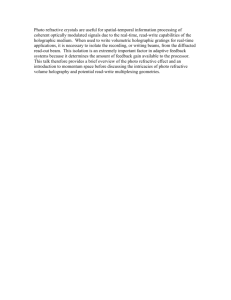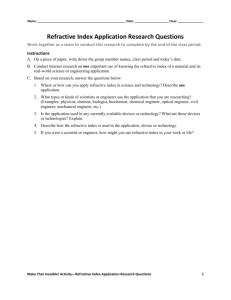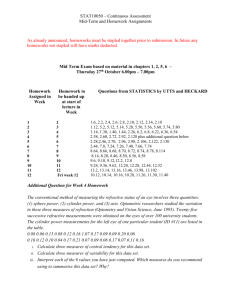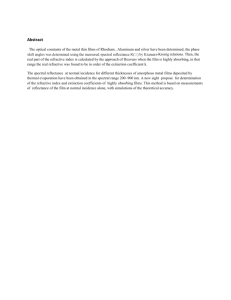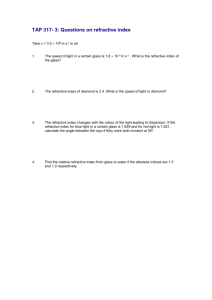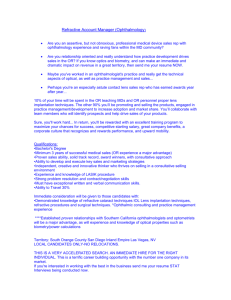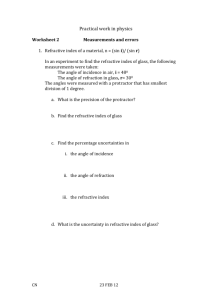Discipline of Optometry and Vision Science
advertisement
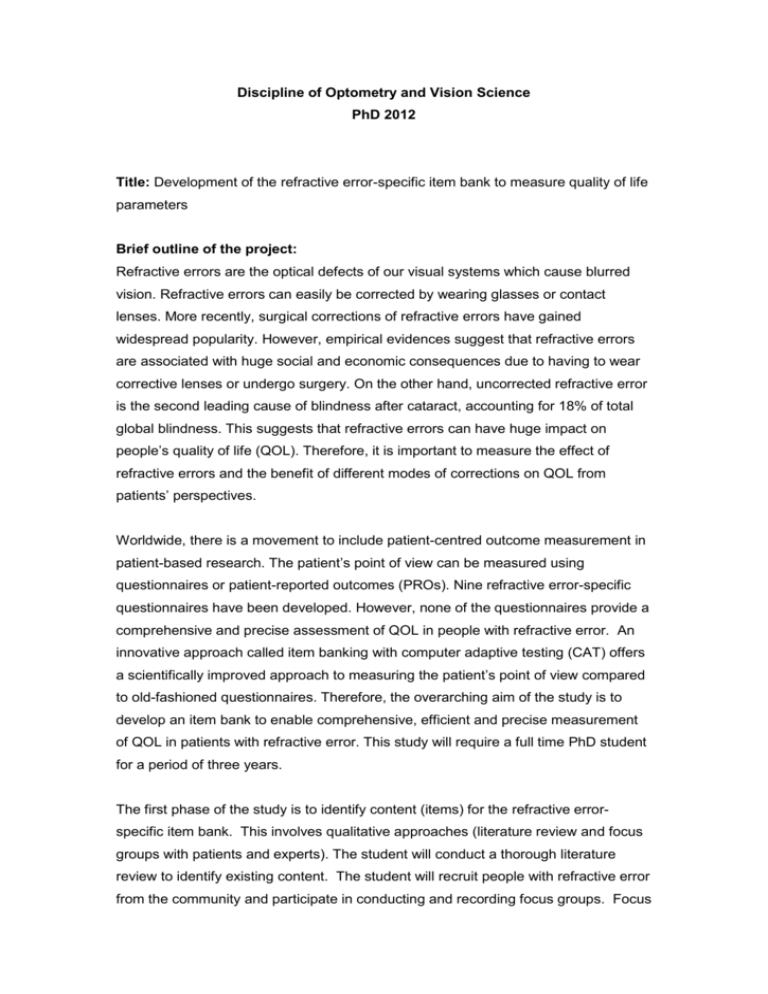
Discipline of Optometry and Vision Science PhD 2012 Title: Development of the refractive error-specific item bank to measure quality of life parameters Brief outline of the project: Refractive errors are the optical defects of our visual systems which cause blurred vision. Refractive errors can easily be corrected by wearing glasses or contact lenses. More recently, surgical corrections of refractive errors have gained widespread popularity. However, empirical evidences suggest that refractive errors are associated with huge social and economic consequences due to having to wear corrective lenses or undergo surgery. On the other hand, uncorrected refractive error is the second leading cause of blindness after cataract, accounting for 18% of total global blindness. This suggests that refractive errors can have huge impact on people’s quality of life (QOL). Therefore, it is important to measure the effect of refractive errors and the benefit of different modes of corrections on QOL from patients’ perspectives. Worldwide, there is a movement to include patient-centred outcome measurement in patient-based research. The patient’s point of view can be measured using questionnaires or patient-reported outcomes (PROs). Nine refractive error-specific questionnaires have been developed. However, none of the questionnaires provide a comprehensive and precise assessment of QOL in people with refractive error. An innovative approach called item banking with computer adaptive testing (CAT) offers a scientifically improved approach to measuring the patient’s point of view compared to old-fashioned questionnaires. Therefore, the overarching aim of the study is to develop an item bank to enable comprehensive, efficient and precise measurement of QOL in patients with refractive error. This study will require a full time PhD student for a period of three years. The first phase of the study is to identify content (items) for the refractive errorspecific item bank. This involves qualitative approaches (literature review and focus groups with patients and experts). The student will conduct a thorough literature review to identify existing content. The student will recruit people with refractive error from the community and participate in conducting and recording focus groups. Focus group output will be transcribed and analysed to identify new content. All content will then be aggregated and refined into a pilot questionnaire. The second phase of the study is to calibrate items using a modern psychometric assessment method called Rasch analysis. This includes administration of the pilot questionnaires and quantitative analysis of the pilot data. The student will recruit people with refractive error from the community and administer the pilot questionnaire, collate data and carry out analysis. The calibrated items will be used to develop a CAT system to implement the refractive error-specific item bank. The third phase includes validation of the item banks implemented via the CAT system. This includes administration of the item banks using the CAT system to people with refractive error and people without any eye conditions. The student will recruit participants from the community and administer the item bank via a CAT system, collate data and carry out analysis for the validation of the CAT system. Key references 1. Dandona R, Dandona L. Refractive error blindness. Bull World Health Organ 2001;79:237-243. 2. Sakimoto T, Rosenblatt MI, Azar DT. Laser eye surgery for refractive errors. Lancet 2006;367:1432-1447. 3. Pesudovs K. Item banking: a generational change in patient-reported outcome measurement. Optom Vis Sci 2010;87:285-293. 4. Wainer H. Computerized adaptive testing. A primer. 2nd ed. Mahway, NJ: Lawerance Erlbaum; 2000. 5. Krueger R.A. Focus groups: a practical guide for applied research. 2nd ed. Thousand Oaks,Calif: Sage Publications, c1994. 6. Bond TG, Fox CM. Applying the Rasch Model: Fundamental Measurement in the Human Science. Second ed. London: Lawerance Erlbaum Associates; 2007. 7. Linacre JM. WINSTEPS Rasch measurement (Computer Program). 7.70.0 Chicago Winsteps; 2010. Suitable applicants This project may suit students from a diverse range of backgrounds. Optometrists, medical graduates, sociologists, psychologists, nurses, medical scientists and other health professionals are all encouraged to apply. Supervisor/co-supervisor’s contact details: Prof Konrad Pesudovs, Discipline of Optometry and Vision Science, Flinders Medical Centre; Phone: 08 8204 5732; Email: konrad.pesudovs@flinders.edu.au Dr Jyoti Khadka, Discipline of Optometry and Vision Science, Flinders Medical Centre; Phone: 08 8204 5730; Email: jyoti.khadka@flinders.edu.au Entry requirements/scholarships Details about the entry requirements, application form and scholarships can be found in the following link http://www.flinders.edu.au/medicine/sites/research-higher-degrees/programsavailable/doctor-of-philosophy.cfm
